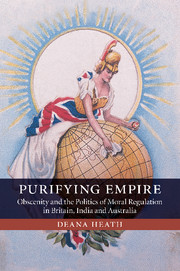Book contents
- Frontmatter
- Contents
- List of abbreviations
- Introduction: Books, boundaries and Britishness
- 1 Colonialism and governmentality
- 2 From sovereignty to governmentality: the emergence of obscenity regulation as a biopolitical project in Britain
- 3 Globalizing the local: imperial hygiene and the regulation of the obscene
- 4 Localizing the global in settler societies: regulating the obscene in Australia
- 5 Localizing the global in exploitation colonies: regulating the obscene in India
- Conclusion: Retangling empire, nation, colony and globe
- Bibliography
- Index
1 - Colonialism and governmentality
Published online by Cambridge University Press: 06 July 2010
- Frontmatter
- Contents
- List of abbreviations
- Introduction: Books, boundaries and Britishness
- 1 Colonialism and governmentality
- 2 From sovereignty to governmentality: the emergence of obscenity regulation as a biopolitical project in Britain
- 3 Globalizing the local: imperial hygiene and the regulation of the obscene
- 4 Localizing the global in settler societies: regulating the obscene in Australia
- 5 Localizing the global in exploitation colonies: regulating the obscene in India
- Conclusion: Retangling empire, nation, colony and globe
- Bibliography
- Index
Summary
Since the work of Michel Foucault, the concept of governmentality has become central to understanding power not simply as repression, but as an epistemological (practical and discursive) phenomenon that normatively produces subjects. The chief concern of governmentality is to apply economy, which Foucault regards as ‘a form of surveillance and control as attentive as that of the head of a family over his household and goods’, to the maintenance of a healthy and productive population. Enacted under the aegis of a series of institutions (the judiciary, the school and the family), discourses (medicine, criminal justice and demography) and procedures and analyses (surveys, statistics and regulations), what is distinctive about this form of power ‘is not its relation to capitalism, but its point of application’, which is the ‘conditions in which [the] body is to live and define its life’ (emphasis in original). In subjecting them to ‘rational’ principles governmentality seeks to foster an identification of interests, a ‘contract between the technologies of domination of others and those of the self’, that ensures that subjects are obliged to transform themselves in an ‘improving direction’ to do as they ought. It thus serves to construct the normative regularities of civil society.
Although not a universal form of power – it emerged, as Foucault made clear, in European society at a specific time and then became gradually more important – scholars of colonialism have traced the emergence of governmental power in colonial contexts through the projects of modernization initiated by colonial regimes.
- Type
- Chapter
- Information
- Purifying EmpireObscenity and the Politics of Moral Regulation in Britain, India and Australia, pp. 8 - 34Publisher: Cambridge University PressPrint publication year: 2010
- 1
- Cited by



